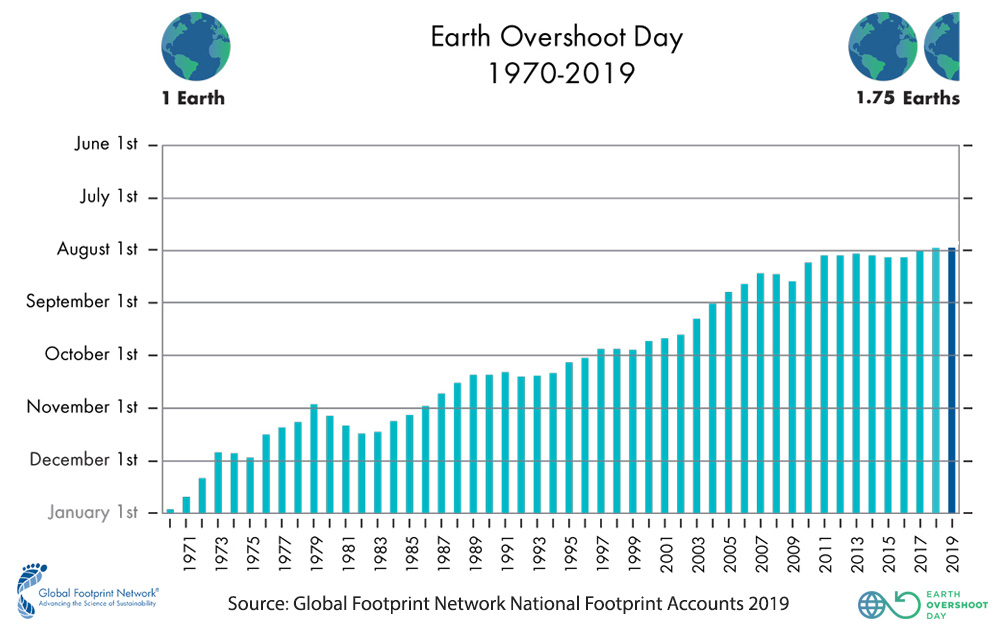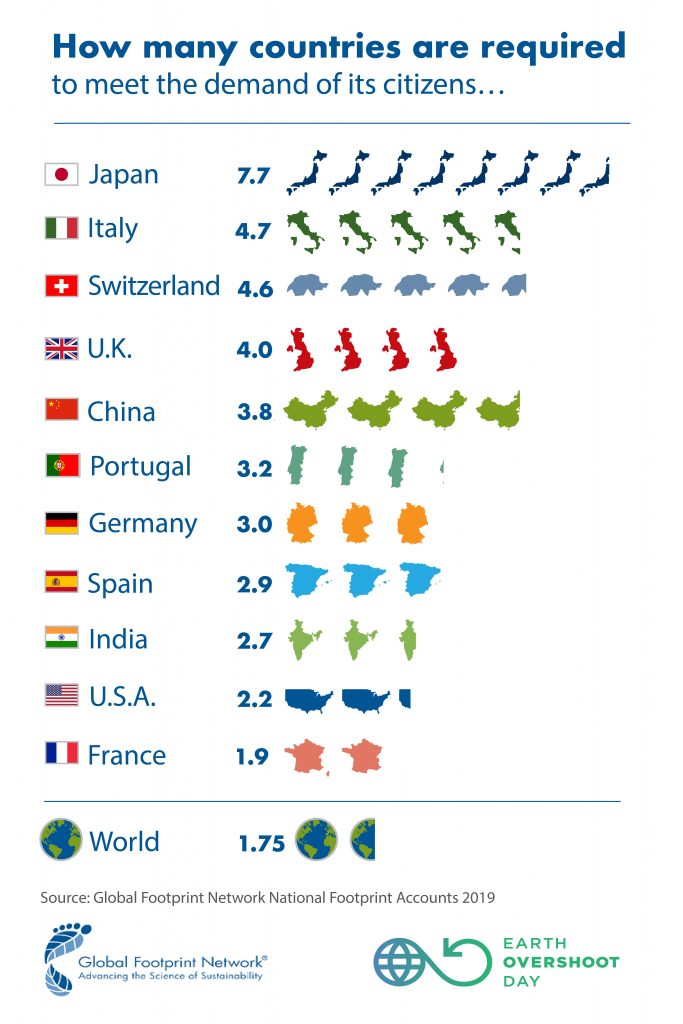Available in additional languages
OAKLAND, CA, USA — JUNE 26, 2019 — On July 29, humanity will have used nature’s resource budget for the entire year, according to Global Footprint Network, an international sustainability organization that has pioneered the Ecological Footprint. The Ecological Footprint adds up all of people’s competing demands for biologically productive areas – food, timber, fibers, carbon sequestration, and accommodation of infrastructure. Currently, carbon emissions from burning fossil fuel comprise 60% of humanity’s Ecological Footprint.
Some 80 000 people have already signed current petitions to US and EU decision makers to demand that biological resource management be placed at the core of the decision-making process.
Earth Overshoot Day marks the date when humanity’s annual demand on nature exceeds what Earth’s ecosystems can regenerate in that year. Over the past 20 years, it has moved up three months to July 29, the earliest ever. This means that humanity is currently using nature 1.75 times faster than our planet’s ecosystems can regenerate, equivalent to 1.75 Earths. Humanity first saw ecological deficit in the early 1970s. Overshoot is possible because we are depleting our natural capital, compromising the planet’s future regenerative capacity.
Ecological overspending costs are becoming increasingly evident: deforestation, soil erosion, biodiversity loss, and the buildup of carbon dioxide in the atmosphere leading to climate change and more frequent extreme weather events.
“Ultimately, human activity will be brought in balance with Earth’s ecological resources. The question is whether we choose to get there by disaster or by design – one-planet misery or one-planet prosperity,” said Mathis Wackernagel, co-inventor of Ecological Footprint accounting and founder of Global Footprint Network.
#MoveTheDate toward one-planet compatibility
If we move the date of Earth Overshoot Day back 5 days annually, humanity can reach one-planet compatibility before 2050. Global Footprint Network highlights opportunities for action that are available today and assesses their impact on the date of Earth Overshoot Day. For instance, replacing 50% of meat consumption with vegetarian food would move the date of Overshoot Day 15 days (10 days for the reduction of methane emissions from livestock alone); reducing the carbon component of the global Ecological Footprint by 50% would move the date 93 days.
Elements of the 2019 campaign
- The Ecological Footprint Calculator is now available in Hindi, English, Chinese, French, German, Portuguese, Spanish and Italian. To date, more than 15 million people have calculated their Ecological Footprint and personal Earth Overshoot Day.
- Global Footprint Network and its partners invite the public to explore “Steps to #MoveTheDate” supporting the global movement towards one-planet compatibility, connected to energy, food, cities, population, and planet. Opportunities for action include starting a population conversation, launching workplace programs like food waste reduction, and petitioning governments to manage natural resources responsibly.
Additional resources
About solutions to #MoveTheDate : www.overshootday.org/solutions
Infographics in multiple languages : https://www.overshootday.org/newsroom/infographics/
About Earth Overshoot Day: www.overshootday.org
Calculate your own Footprint : www.footprintcalculator.org
Explore all countries’ Ecological Footprint and biocapacity : data.footprintnetwork.org
New book about Ecological Footprint accounting, with excerpts available for publication: https://www.newsociety.com/Books/E/Ecological-Footprint
About Global Footprint Network
Global Footprint Network, the host of Earth Overshoot Day, is an international sustainability organization that is helping the world to better manage its natural resources and respond to climate change. Since 2003 we’ve engaged with more than 50 countries, 30 cities, and 70 global partners to deliver scientific insights that have driven high-impact policy and investment decisions. Together, we’re creating a future where all of us can thrive within the limits of our one planet.
www.footprintnetwork.org




